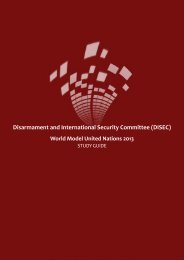National Transitional Council of Libya - World Model United Nations
National Transitional Council of Libya - World Model United Nations
National Transitional Council of Libya - World Model United Nations
You also want an ePaper? Increase the reach of your titles
YUMPU automatically turns print PDFs into web optimized ePapers that Google loves.
was too moderate and lacked commitment to Arab<br />
unity. The carefully organized plan involved shooting<br />
down Hussein’s private jet. Though the assassination<br />
was well planned and elaborate, at the last minute,<br />
Qaddafi’s personal assassin defected and warned<br />
Hussein about the plot. 30 In 1984, Qaddafi ordered a<br />
bombing run <strong>of</strong> a radio station in Omdurman, Sudan.<br />
The radio station had been broadcasting anti-Qaddafi<br />
propaganda, and Qaddafi wanted to send a powerful<br />
message to the Sudanese government. However,<br />
like many <strong>of</strong> his other initiatives, this too failed when<br />
the bomber missed, killing only a street vendor. 31<br />
That July, ships began experiencing explosions while<br />
passing through the Red Sea. By August, seventeen<br />
ships had been sunk by small underwater mines;<br />
these were traced back to Qaddafi, who had claimed<br />
that ships carrying goods to Israel should be sunk and<br />
that Arab oil “should be destroyed if it is not used for<br />
the liberation <strong>of</strong> Palestine.” 32 Qaddafi continued to<br />
support, sponsor, and promote terrorism throughout<br />
the world for the next half decade, only slowing down<br />
when the world began to actively turn against him in<br />
the early 1990s.<br />
<strong>Libya</strong> and the US<br />
In response to Qaddafi’s increasing support <strong>of</strong><br />
terrorism, the US began taking steps against <strong>Libya</strong>. In<br />
1978, President Carter prohibited the sale <strong>of</strong> military<br />
equipment to Qaddafi’s forces, and in February<br />
1980, Carter closed down the US embassy in Tripoli.<br />
However, these steps were relatively minor. In January<br />
1981, Ronald Reagan replaced Carter, a change that<br />
would cause problems for <strong>Libya</strong>. Reagan was far<br />
more outspoken against <strong>Libya</strong> and its actions, viewing<br />
<strong>Libya</strong> as a visible target against which he could assert<br />
American power and strength. Labeling Qaddafi as<br />
the “Mad Dog <strong>of</strong> the Middle East,” Reagan actively<br />
worked against his regime. By early 1982, Reagan had<br />
closed the <strong>Libya</strong>n embassy in Washington, prohibited<br />
travel to <strong>Libya</strong>, embargoed crude oil imports from<br />
<strong>Libya</strong>, and prohibited US export <strong>of</strong> refined oil and gas<br />
to <strong>Libya</strong>. 33<br />
In mid-1981, the conflict took a sharp turn for the<br />
worse when two <strong>Libya</strong>n jet fighters were shot down<br />
by the <strong>United</strong> States’ Sixth Fleet. The fighters had<br />
been in a dogfight over the Gulf <strong>of</strong> Sirte, which <strong>Libya</strong><br />
claimed as its own but which the West considered<br />
international waters. Qaddafi attempted to use the<br />
attack as a catalyst to mobilize <strong>Libya</strong>ns against the<br />
<strong>United</strong> States. Armed with fiery anti-West rhetoric,<br />
Qaddafi proposed the creation <strong>of</strong> a popular army. The<br />
goal behind the creation <strong>of</strong> this army was to increase<br />
nationalism and anti-Western feelings among the<br />
general public. However, as had been the case in the<br />
past, the <strong>Libya</strong>n people were not eager to participate<br />
in Qaddafi’s popular movement, and the push for a<br />
popular army was unsuccessful. However, in the wake<br />
<strong>of</strong> the Sirte confrontation, <strong>Libya</strong> signed a treaty with<br />
the pro-Soviet nations <strong>of</strong> Ethiopia and South Yemen,<br />
indicating its support for the uSSR against “American<br />
aggression” in the Arab world. 34<br />
Tensions between <strong>Libya</strong> and the US continued to<br />
rise throughout the early 1980s. In early 1983, Qaddafi<br />
adopted the term “devil on earth” when referring to<br />
the US, and on 18 February 1983, he orchestrated<br />
massive anti-US demonstrations, publicly burning<br />
effigies <strong>of</strong> Reagan. Later that year, a suicide bomber<br />
linked to <strong>Libya</strong> attacked the US embassy in Lebanon.<br />
A year later, in 1984, a major attack on Qaddafi’s<br />
Tripoli <strong>of</strong>fice was carried out by the <strong>National</strong> Front for<br />
the Salvation <strong>of</strong> <strong>Libya</strong>, an opposition group organized<br />
by the pro-American government <strong>of</strong> Sudan. When<br />
the same pro-American Sudanese government was<br />
overthrown in 1985, Washington naturally suspected<br />
<strong>Libya</strong>. Their suspicions were heightened when<br />
Qaddafi declared, “Reagan has nothing to do with<br />
Sudan. Sudan is ours.” 35 <strong>Libya</strong> continued to work<br />
against American policy in Africa and the Middle<br />
east, supporting Palestinian terrorist groups, and<br />
hijacking ships and jets with American citizens on<br />
board. Tensions came to a head in March 1986, when<br />
a second incident occurred in the Gulf <strong>of</strong> Sirte, in<br />
which missiles were exchanged between <strong>Libya</strong>n and<br />
American forces. Then, on 5 April 1986, a German<br />
discotheque named La Belle was bombed by <strong>Libya</strong>ns,<br />
wounding hundreds and killing two US soldiers.<br />
For the <strong>United</strong> States, the bombing <strong>of</strong> La Belle<br />
was the last straw. Washington immediately sought<br />
European aid against <strong>Libya</strong>, and within a few weeks,<br />
Great Britain agreed to let uS aircraft use British<br />
bases, and the European Economic Community<br />
16<br />
Melbourne Host Directorate PTY LTD | Office <strong>of</strong> Media and Design
















